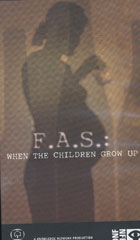
F.A.S. When the Children Grow Up 2002
Distributed by National Film Board of Canada, 1123 Broadway, Suite 307, New York, NY 10010; 800-542-2164
Produced by Sharon Bartlett and Maria LeRose
Directed by Sharon Bartlett and Maria LeRose
VHS, color, 40 min.
Sr. High - Adult
Health Sciences, Psychology, Child Development, Disability Studies, Sociology, Parenting
Date Entered: 03/10/2006
Reviewed by Lori Widzinski, Health Sciences Library, University at Buffalo, State University of New YorkThis National Film Board of Canada production sheds light on the misunderstood and under-diagnosed problem of adults with Fetal Alcohol Syndrome and Fetal Alcohol Effects. Through interviews with young adults who have FAS/FAE, their parents, physicians and social workers, the picture soon emerges of a lifelong struggle to help those afflicted live as normal a life as possible.
FAS/FAE adults need lots of structure in their world. Simplicity in their work and surroundings is essential for any chance at controlling or modifying their behavior. The young adults profiled here are attractive, likeable people with varying degrees of disability. Their emotional maturity is far below that of their chronological age, and because of their learning disabilities or brain damage their gullible nature is easily manipulated.
Parenting an FAS/FAE young adult is a tiring, never-ending job, and fledging these young people into the world is not an easy proposition. The most revealing scene is FAS parent and retired corrections officer Bob Steeve’s emotional confession of how poorly he treated young adult criminals who probably suffered from FAS or FAE. Not knowing about adult FAS at the time, and only realizing it after his son was diagnosed, his deep regret is palpable. Adult FAS/FAE sufferers don’t learn by the consequences of their actions, so those that are in trouble, continue with the same behaviors, not realizing it often leads to a more serious outcome.
The film highlights programs to help FAS/FAE adults in British Columbia, where it was produced. Since it is a Canadian production, the references and situations are obviously Canadian, but similar programs and statistics are most likely reflected in the U.S. as well. Although made in 2002, it is still one of the few documentaries providing a balanced, realistic view of the impact solely of adult FAS/FAE. NFBC’s high production values are evident throughout this film, and it is recommended for high school and college level library collections focusing on social work, disability studies and related subject areas.